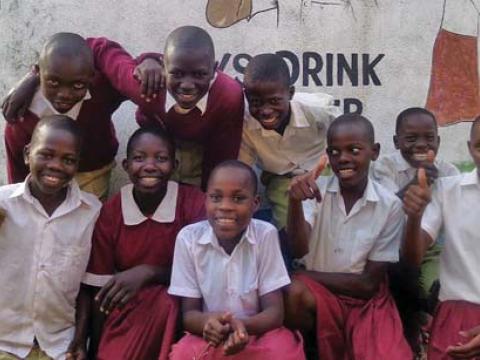Kenyan school health club teaching about good hygiene and sanitation

Georgina lives with her grandmother and some of her siblings. Before joining the health club, her family used untreated water for drinking and cooking, which caused water-related diseases. “We used to get stomach problems, typhoid, and diarrhea,” Georgina said. “One day I drank dirty water and got typhoid and stayed in the hospital for one week. I felt so sick, like the body was not mine,” she added.
But thanks to the Kenya WASH Program and health clubs like the one at Kachan Primary School, the situation has improved. Katito ADP works with schoolteachers through health clubs to teach students good hygiene and sanitation. The children learn to treat water and wash their hands at critical times (before eating and after using the latrine). “Through our health club, we have been taught to treat drinking water (using Water Guard, a chlorine compound sold in shops). We have also learned about the importance and proper use of latrines and also about general body cleanliness,” said Georgina.
Kachan Primary School is now teaching other schools in the area how to run vibrant health clubs. “The school has won many local trophies in songs, dramas, and poems related to health club competitions,” said Grace Abuom, the health club teacher.
Many students say the health club has made a positive difference in their lives. Awiti, a sixth-grade girl, explained, “I did not know science very well, but because in the health club we learn science, my grades have improved.”
Indeed, school attendance has improved since handwashing facilities were installed and the health club began spreading messages on good hygiene practices. This has contributed to school enrollment increasing from 405 students in 2012 to 500 students in 2013. And the school is one of the best in the area in academic performance.
According to teacher Grace, the students, on their own initiative, volunteer to ensure the school and latrines are kept clean. The health club trains children to be leaders in their school, home, and community. This behavior change will carry on into their adult life, which means change also happens in the community. “We now have toilets at home and hand-washing points,” said Narkisho, another student.